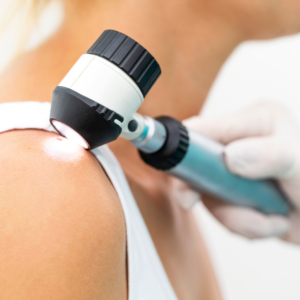Skin Cancer Screening
 Skin cancer is one of the most common forms of cancer in Australia and early detection is key to ensuring successful treatment. To assist in identifying skin cancer in its early, non-melanoma stages, Nuvo Health provides thorough skin cancer screening services at our medical centres.
Skin cancer is one of the most common forms of cancer in Australia and early detection is key to ensuring successful treatment. To assist in identifying skin cancer in its early, non-melanoma stages, Nuvo Health provides thorough skin cancer screening services at our medical centres.
Our team of doctors are trained to perform skin exams and biopsies, as well as to identify the signs and symptoms of skin cancer. We use state-of-the-art technology and techniques, such as dermoscopy and total body photography, to aid in the detection of skin cancer.
We recommend that all Australian adults have a full-body skin exam at least once a year, especially if they have a history of skin cancer, a family history of skin cancer, or have a lot of sun exposure. Melanomas only migrate to lymph glands once they break through the deeper layer of the skin, which means the earlier you pick them up the better. Early melanoma diagnoses have an excellent survival rate.
It’s important to not only schedule annual skin check-ups with a doctor but also to regularly check your own skin for any changes or abnormalities. By having yourself or your partner inspect your skin on a monthly basis, you can quickly identify any irregularities. This guide will provide tips on how to perform a self-examination and what to look for.
Remember your ABCDEs
To aid in the detection of skin cancer, patients are able to use the ABCDE’s of melanoma identification as guidelines when conducting self-examinations. The letters stand for:
A – Asymmetry: One half of a mole or birthmark does not match the other.
B – Border: The edges of the mole or birthmark are irregular, scalloped, or notched.
C – Colour: The colour of the mole or birthmark is not the same throughout, with different shades of tan, brown, or black, or it has blue, red, white, or other colours.
D – Diameter: The mole or birthmark is larger than a pencil eraser, or about 6mm (about 1/4 inch) in diameter.
E – Evolving: Any changes in the size, shape, colour, or elevation of a mole or birthmark, or the appearance of new symptoms such as itching, bleeding, or crusting.
It is important to note that not all melanomas will have all of these characteristics, but the presence of any of these signs should be evaluated by a doctor, as well as any new or changing moles or birthmarks.
Prevention is key
What are a few ways you can help protect yourself against skin cancer before visiting us?:
- Inspect your skin regularly on a monthly basis
- Schedule annual check-ups with your GP for skin evaluations
- Protect yourself by wearing clothing and accessories such as hats and UV-blocking sunglasses
- Apply sunscreen before sun exposure and reapply every 2 hours
- Avoid prolonged sun exposure during peak hours (10am-4pm)
- Refrain from using tanning beds
- Keep infants out of direct sunlight
- Do not use sunscreen on infants under 6 months old.
Our doctor’s also understand that a potential skin cancer diagnosis can be stressful, and our team is here to support you every step of the way, from screening and diagnosis to treatment and follow-up care. We strive to create a welcoming and inclusive environment where patients feel comfortable and well-cared for.
If you would like to make an appointment to see a doctor please book online or call your nearest Nuvo Health location today.
